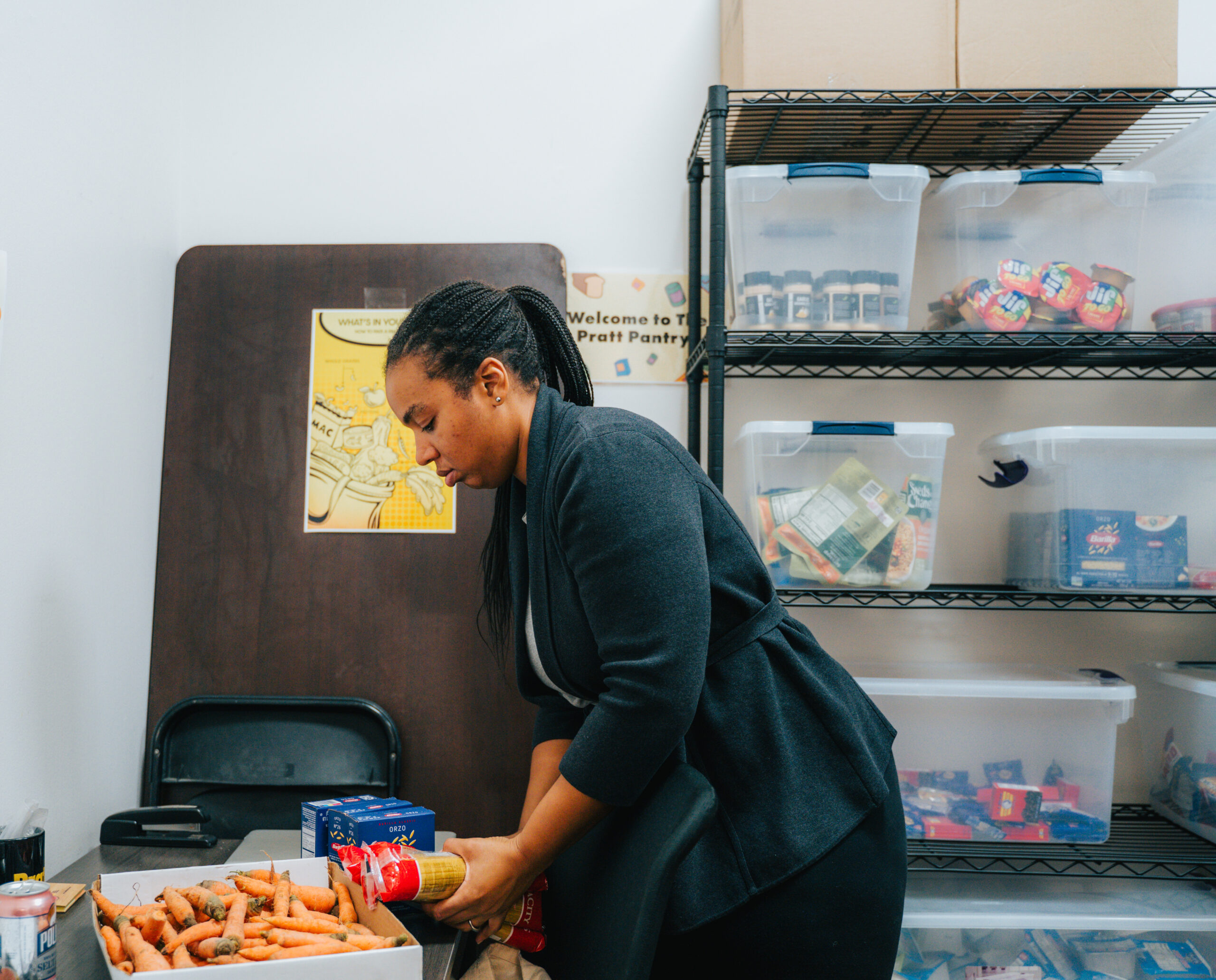Food insecurity affects more than 1 in 5 undergraduate students in the US, according to a representative survey of 100,000 participants by the U.S. Department of Education, and analysts believe that the current rate of food insecurity may be even higher. With adverse effects on health and academic performance, this problem is a crucial issue throughout the world of higher education.
Various support programs are in place to help Pratt students when they encounter food insecurity. The Resilience, Wellness, and Wellbeing Center, in particular, has a multifaceted approach to alleviating hunger.
From the Pratt Food Pantry to the Pratt Food Insecurity Fund, these resources are a crucial lifeline for students.
Martha Cedarholm, senior student advocate and care coordinator, helps oversee these efforts and works with students to devise short- and long-term support plans so they can thrive at Pratt. She recently spoke about hunger on college campuses and how Pratt is helping students.
What are some national drivers of food insecurity on college campuses, particularly in New York?
There are many factors contributing to food insecurity among college students, but the high cost of living and increases in food prices are significant issues for students in New York City. Frequently, students are strongly impacted by the economic issues that their families are facing, and these circumstances have worsened since the COVID-19 pandemic began. Additionally, there are numerous barriers to accessing government food assistance programs, particularly for younger students and those from out of state.
How can the broader Pratt community support efforts to combat food insecurity on campus?
The broader Pratt community can help by donating food and other items, including personal hygiene products, to the food pantry. Students, staff, and faculty can use the Share Meals app to announce immediate free food resources, such as leftover food after events and programs that students can retrieve. This app also helps to reduce food waste on our campus. Finally, funds can be donated via Institutional Advancement to the annual campaigns that contribute to the Courtesy Meals project.
How does the Pratt Food Insecurity Fund help support the Courtesy Meals project and how will it maintain a focus on long-term sustainability and resilience in addressing food insecurity?
Students with financial need may apply for Courtesy Meals, which provide a credit to a student’s Pratt ID, and these Dining Points are accepted at our Brooklyn campus in the Main Dining Hall, the C-Store in the Willoughby Residence Hall, and the cafes in Steuben Hall and Higgins Hall.
Students are also referred to the student advocate and care coordinator for further support and connection to campus and community resources. The greatest long-term benefit of this process is that it connects students to a support system wherein their larger needs can then be addressed, to which students return throughout their time at Pratt.
How does Pratt ensure that students have the resources and networks to stay nourished throughout the year, including during times outside the semester?
Students may work with staff from Student Support and Advocacy, or Health Promotion/Resilience Wellbeing and Wellness to develop sustainable support plans. This may include help in accessing community support, government assistance programs such SNAP, and advocacy to seek additional funding through Student Financial Services.
How does your work tackling food insecurity relate to your overall role as a senior student advocate and care coordinator?
The purpose of my role is to ensure that students get the help and resources they need to engage in a positive and meaningful learning experience. Meeting basic needs, such as food security, is the first and crucial step in this process that improves and sustains health and wellbeing, which then supports students to be better able to focus on this experience and thrive.
It’s incredibly rewarding to see the difference that the support can make for students. When I get a chance to see the work that they’re doing, when I see how successful they are in their classes, watch them graduate and move on, then I can see that they are beginning to thrive. It’s also very rewarding when the students I have worked with then refer their friends and classmates to me and other supporters on campus. It confirms that I must have helped, but it also means that the experience of getting help perhaps made them begin to think about how they can help others.
This Giving Tuesday, November 28, join us to address food insecurity and make a difference in the lives of Pratt students. Donate to the Pratt Food Insecurity Fund today.
